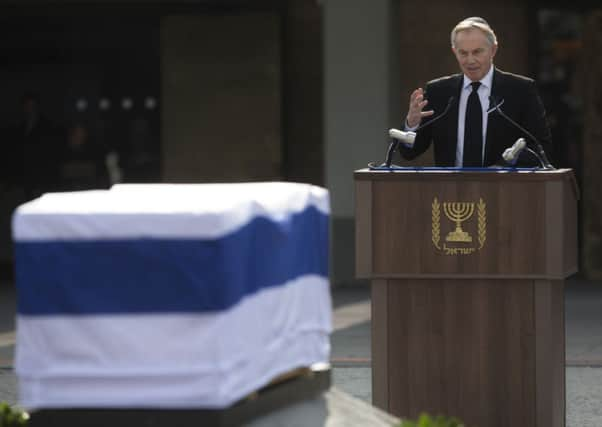Israel lays to rest Ariel Sharon


Eulogised first in a ceremony in Jerusalem, and later in the fields of his estate, a stream of speakers hailed a life entwined with that of his country, while gently alluding to the controversies that also defined his career.
Former prime minister Tony Blair and US vice-president Joe Biden laid wreaths at his grave, six miles from the Gaza strip, with the army on high alert lest rockets be fired from Palestinian territory. The army said two missiles had been fired into Israel after the funeral ended, causing no damage or injury.
Advertisement
Hide AdAdvertisement
Hide AdMr Sharon, 85, died on Saturday after spending the last eight years of his life motionless in a hospital bed, pitched into a coma by a stroke and far from the public gaze.
The death of the former army general reopened the debate on his legacy. Foes denounced his ruthless conduct in military operations, while friends praised him as a strategic genius who, as PM, stunned the world in 2005 by pulling Israeli troops and settlers out of the Gaza strip.
In Jerusalem, aside the coffin draped in Israel’s flag, president Shimon Peres said: “We are accompanying to his final resting place today a soldier, an exceptional soldier, a commander who knew how to win.”
Mr Biden, using Mr Sharon’s nickname, said: “The security of his people was always Arik’s unwavering mission – a non-breakable commitment to the future of Jews, whether 30 years or 300 years from now.”
There was no direct mention of events that made Mr Sharon a hated figure in the Arab world, such as the 1982 invasion of Lebanon that he masterminded as defence minister. However, in his eulogy, Mr Blair said a man known at home as “the bulldozer” had left “considerable debris in his wake”. Mr Biden referred simply to his “mistakes”, saying: “History will judge that he also lived in complex times, in a very complex neighbourhood.”
The Israeli foreign ministry said dignitaries had come from 21 countries, mainly in Europe, but did not list any delegations from the Middle East, Africa or Latin America.
Prime minister Benjamin Netanyahu, noting he had not always seen eye to eye with Mr Sharon on policy matters, praised the former leader’s commitment to Israel’s security.
“Arik understood that in matters of our existence and security, we must stand firm,” he said.
Advertisement
Hide AdAdvertisement
Hide Ad“Israel will continue to fight terror. Israel will continue to strive for peace, while protecting our security. Israel will act in every way to deny Iran the capability of arming itself with nuclear weapons.”
Beefy and brusque, Mr Sharon was seen as a strategic genius at home, with his crossing of the Suez Canal in the 1973 Yom Kippur war against Egypt still studied in military college.
By the same token, the drawn-out 1982 campaign in Lebanon is seen as his worst mistake, which hit a low tide when hundreds of Palestinian civilians in the refugee camps of Sabra and Shatila were killed by Israeli-allied Christian militiamen.
Mr Sharon was forced to quit as defence chief in 1983 after an Israeli investigation said he bore “personal responsibility” for not preventing the massacre. But he bounced back and was PM from 2001 until his stroke.
Neither Mr Netanyahu nor Mr Peres mentioned the Lebanon war or disengagement from Gaza, which showed Israel could roll back its occupation of Palestinian territories given determined leadership. Messrs Biden and Blair welcomed the pullout.